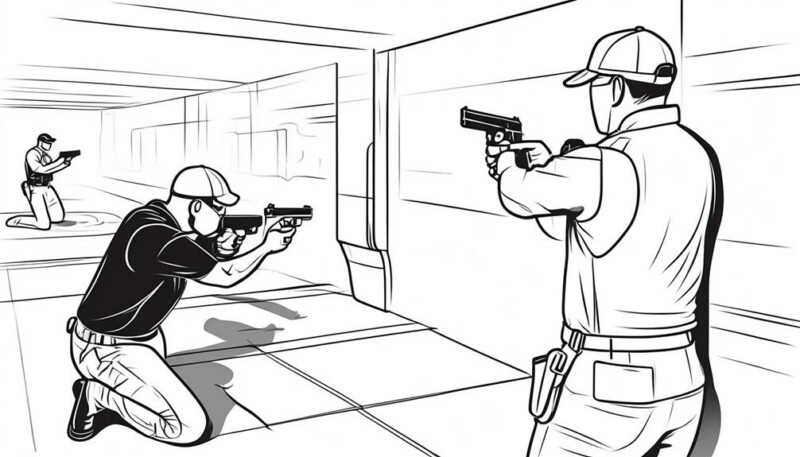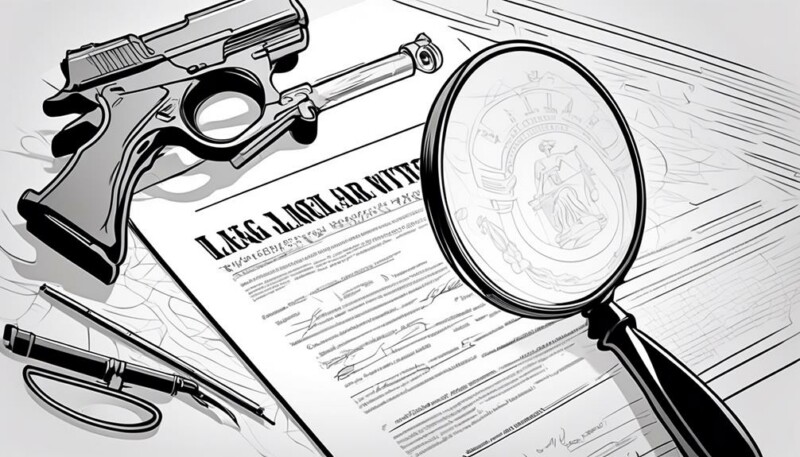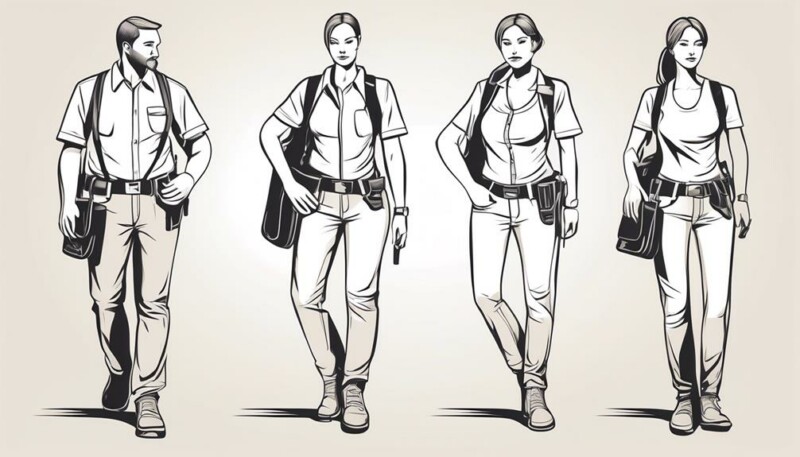Peering into the prospect of personal protection, you might find yourself considering a concealed carry permit. You're not alone. Many people are turning to this option for a myriad of reasons – some for self-defense, others for the defense of loved ones, and even more for the simple exercise of their Second Amendment rights.
But before you embark on this journey, it's essential to understand why it might be the right choice for you, and to grasp the gravity of the responsibility that comes with it.
So, let's dive into the details, shall we?
Key Takeaways
- Obtaining a concealed carry permit enhances personal safety and self-defense, providing legal protection and peace of mind.
- Choosing the right carry equipment, including a reliable firearm and a suitable holster, is crucial for comfortable and effective concealed carry.
- Understanding and complying with the laws and regulations regarding concealed carry in your jurisdiction is essential to ensure legal compliance.
- Regular training and practice are necessary to maintain skills and proficiency in handling firearms and to stay updated on new techniques and gear.
Understanding Concealed Carry Basics

Before you can effectively carry a concealed weapon, it's crucial to understand the basics of concealed carry, including the laws, safety measures, and proper handling techniques. This is the essence of the Beginners Guide to Concealed Carry, a must-have resource for anyone interested in obtaining a concealed carry license.
The first step in understanding concealed carry basics is familiarizing yourself with the firearm you'll carry. This includes knowing how to safely load, unload, and store the firearm. Knowing the best concealed carry for your lifestyle and comfort is essential too.
Next, you need to understand the laws for your state. Each state has specific regulations pertaining to CCW permits. You're required to know these laws inside and out, as ignorance isn't a valid defense.
Lastly, remember that safety is paramount when carrying a concealed weapon. Always treat your firearm as if it's loaded, never point it at anything you don't intend to destroy, and always be sure of your target and what's behind it.
Mastering these basics will put you on the path to responsible and legal concealed carry.
Assessing Personal Reasons for Concealment
Having mastered the basic principles of concealed carry, it's now essential to assess why you personally want to carry a concealed firearm. Are you doing it for personal protection or do you feel a duty to protect those around you? Perhaps it's an exercise of your constitutional rights? Whatever your reason, it's important to be clear about it.
Here's a 4-step guide to help you:
- Understand your Motivation: Is it personal safety, protection of loved ones, or peace of mind? Your reason will guide your actions and decisions.
- Assess Risks & Benefits: Carrying a Concealed Handgun has potential risks and benefits. Be sure to consider these in your decision-making process.
- Reflect on your Lifestyle: Concealed carry requires a certain level of responsibility. Assess how this aligns with your lifestyle and values.
- Consider Legal Implications: More states are enacting laws around concealed carry. Familiarize yourself with these and ensure you're ready to comply.
Legalities Around Concealed Carry

Navigating the maze of concealed carry laws might seem daunting, but it's crucial to understand your local jurisdiction's rules before you strap on that holster. The legalities around concealed carry are not universal. They can vary significantly from one location to another, so it's essential for you to be knowledgeable about your specific area's regulations.
Before you start carrying a handgun, ensure you've researched whether your area requires specific concealed carry weapon (CCW) permits or additional training. Don't make assumptions; check the facts.
When you're travelling, bear in mind that laws can differ between states. A permit valid in your home state might not be recognized elsewhere.
To help you understand, here's a simple table breaking down the basic legalities:
| Area | Legalities Around Concealed Carry |
|---|---|
| Local Jurisdiction | Examine local laws |
| Travel | Check reciprocity laws |
| Training | Ensure required training is completed |
Choosing the Right Carry Equipment
When it comes to choosing the right carry equipment, factors like comfort, accessibility, and concealment should be your top considerations. You're not merely carrying a concealed item but a tool for your safety.
Consider the *carry position*. Hip, back, appendix, ankle, and bag/purse carry all have their advantages and disadvantages. Your body type, daily routine, and clothing choice will help determine the best fit.
Evaluate the *best gun* options. While the specific concealed carry gun model matters, prioritize reliability and the fit in your hand over the brand.
Choose your *holster and firearm* carefully. Inside the waistband (IWB) and Outside the waistband (OWB) holsters are common choices. IWB offers discreet, comfortable concealed carry but may limit accessibility, while OWB improves accessibility but may limit concealment.
Lastly, don't overlook the importance of *clothing*. Your wardrobe should allow natural, unrestricted movement while maintaining adequate concealment.
Different Concealed Carry Methods

Understanding different concealed carry methods can significantly enhance your comfort, convenience, and safety. It's crucial to find a method that suits your body type, clothing preferences, and lifestyle. Let's delve into three popular methods: hip carry, appendix carry, and ankle carry.
Hip carry, often using a waistband holster, is favored due to its ease of access and various clothing options. Appendix carry, positioned in front of the hip, provides excellent concealment and a natural draw motion. Ankle carry, ideal for secondary firearms, offers a quick draw and works well with certain clothing.
| Carry Method | Pros |
|---|---|
| Hip Carry | Easy access, various clothing options |
| Appendix Carry | Excellent concealment, natural draw motion |
| Ankle Carry | Quick draw, works well with different clothing |
Selecting Suitable Concealed Firearms
Now that you're familiar with various carry methods, it's important to focus on selecting the appropriate firearm for concealed carry. When considering carrying, you need to consider several factors.
- Size: The carry firearm should be small enough to conceal but still functional. It should be easy to carry, considering your daily activities and clothing style.
- Fit: It should fit your hand comfortably. This ensures better control and accuracy.
- Caliber: A higher caliber firearm may be more powerful but it's also heavier. Consider your ability to manage the recoil.
- Reliability: Your life may depend on this firearm. It needs to be a reliable model from a reputable manufacturer.
In selecting suitable concealed firearms, the above factors play a vital role. For beginners, a compact 9mm handgun is often an excellent choice. They're easy to handle, provide adequate self-defense, and come in various models that could fit your requirements.
Steps to Obtain a Concealed Carry Permit

Getting a concealed carry permit involves a few key steps.
First, you'll need to evaluate if you meet the eligibility criteria.
Then, you'll need to complete essential training and navigate the application process.
Eligibility Criteria Evaluation
Before you can obtain a concealed carry permit, you'll need to meet the specific eligibility criteria set by your state's laws. This is a critical part of the 'eligibility criteria evaluation' that you must fully understand.
Here is what you need to know:
- Age: You'll need to be at least 21 in most states.
- Residency: You must reside in the state where you apply for the permit.
- Criminal Record: If you've been convicted of certain crimes, you mightn't even consider carrying.
- Training: Some states require a firearm safety course.
This 'Must Know' list is just a start. It's important to research your state's specific laws and consider carrying responsibly.
Essential Training Requirements
To secure a concealed carry permit, you'll need to undertake a series of crucial steps, starting with completing a comprehensive firearms safety course. This course will equip you with the need-to-know aspects of gun handling, safety, and laws.
Next, consider applying for your permit via your local law enforcement agency or your state's department of public safety. Make sure to familiarize yourself with your state-specific laws regarding carrying a firearm concealed. This knowledge will prove invaluable when you're out and about, going to carry your firearm.
It's also essential to practice drawing from concealment regularly at a shooting range to maintain your skills.
Lastly, stay informed about changes in laws, regulations, and new gear or techniques.
Application Process Insights
Navigating the application process for a concealed carry permit can seem daunting, but by understanding the eligibility requirements and necessary documentation, you'll be well on your way to obtaining your permit.
This novice's guide provides application process insights to aid you.
- Understand the Application Process: Familiarize yourself with the eligibility criteria and gather the required documents.
- Research Local Laws: Some regions have tighter restrictions on concealed carry permits. Knowing these will save you time and hassle.
- Complete Required Training: Enroll in a firearm safety course. This not only adds credibility to your application but also ensures your access to the firearm is safe.
- Submit the Application: After filling out the application thoroughly, submit it as per the guidelines.
Frequently Asked Questions
Why Do People Choose to Conceal Carry?
You might choose to conceal carry for several reasons.
Primarily, it's about self-defense. You could be looking to protect yourself, your family, or even strangers from physical harm. Maybe you're concerned about wildlife threats.
It's also a way to exercise your constitutional rights.
Ultimately, carrying a concealed firearm can offer you peace of mind in situations that are unpredictable or dangerous. It's about feeling secure and prepared.
What Kind of Gun Should I Get as a Beginner?
As a beginner, you're not looking to bite off more than you can chew. Your first gun should be manageable and user-friendly. Consider factors like size, weight, and ease of use.
Don't shy away from seeking guidance from seasoned individuals. Safety should be your top priority, so pick a firearm that's easy to maintain.
What Is Required for Concealed Carry in Colorado?
In Colorado, you need to be 21 or older to apply for a concealed carry permit.
Don't forget, you also need to take a handgun training course, approved by the county sheriff, in the last 10 years.
You'll have to submit your fingerprints to the Colorado Bureau of Investigations for a background check.
It's also necessary to be a legal US and Colorado resident, and not be barred from possessing a firearm by law.
Why Do I Need a Concealed Carry Permit in Texas?
Like a shield, a concealed carry permit gives you control over your own safety in Texas. You'll need it to legally carry a concealed weapon.
This permit allows you to protect yourself and your loved ones from potential threats. It's also a way to exercise your Second Amendment rights responsibly.
Lastly, it serves as a deterrent to criminals, contributing to a safer community.
Conclusion
So, you've spent time understanding the basics, assessing your reasons, and learning all about the laws.
Now, ironically, the choice to carry concealed isn't concealed at all; it's as clear as a clean shot. You've learned how to choose your equipment, methods, and firearms responsibly.
Eventually, the path to obtaining your permit isn't a mystery anymore, it's a well-lit road.
Welcome to the world of responsible concealed carry.
